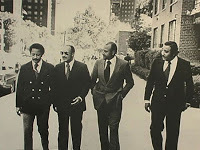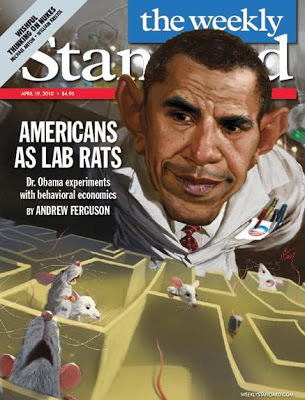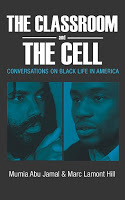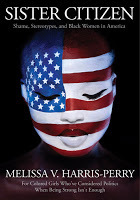Mark Anthony Neal's Blog, page 1026
February 5, 2012
Angela Davis | from 'The Black Power Mixtape'
Published on February 05, 2012 16:22
Trailer: 'Harlem Gang of Four'
The Harlem Gang of Four documentary is being created by Leah Natasha Thomas and will tell the story of 4 of America's most profound leaders - Congressman Charles Rangel, former Manhattan Borough President Percy Sutton, former Mayor David Dinkins and former Secretary of State Basil Paterson.
Published on February 05, 2012 12:34
February 4, 2012
A Nation Within a Nation: Albert Cleage (Jaramogi Abebe Agyeman) on Black Self-Determination
Interview with Albert Cleage (Jaramogi Abebe Agyeman), founder of the Shrines of the Black Madonna of the Pan African Orthodox Christian Church (PAOCC) and father of the modern "black" theology movement, late December 1967/early January 1968.
Published on February 04, 2012 13:59
Saturday Edition | Don Cornelius and the Legacy of Black Independent Media

Saturday Edition Don Cornelius and the Legacy of BlackIndependent Media by Mark Anthony Neal | NewBlackMan
Therecent death of Don Cornelius, founder and host of the long-running syndicatedseries Soul Train, brought back into the focus the role ofBlack independent media.
Though Soul Train stopped production more thanfive years ago, the show remains one of the most resonant Black brands inAmerican culture and a metaphor for the freedoms and possibilities in the earlyyears of the post-Civil Rights era.
Soul Train's influence as an arbiter of Black youth style andculture in the 1970s is well known, as is its critical role in delivering blackconsumers to mainstream advertisers. The nationally syndicated programs of Tom Joyner and MichaelBaisden, would have been virtually impossible without the path that DonCornelius made with Soul Train in the1970s.
Inthe early days of the show when those very mainstream advertisers were stillvery skeptical about the nationalspending power of Black communities, and even Black record executives andartists were a little suspect of the show, Cornelius found his biggest supportin Black owned companies, like the Johnson Company—home of the ubiquitous 1970ssymbol Afro-Sheen—and so-called second-tier acts—those unlikely to cross-overto pop audiences.
Fortyyears later, one of the great joys of SoulTrain as intellectual property is that early footage of those Afro-Sheencommercials—like the one where Frederick Douglass lectures a black teen abouthis un-combed Afro—and of artists who have long been off the radar, save theircontinuous reclamation in Hip-Hop's sonic archive. Indeed, part of the genius of Cornelius was understandingthe value of Soul Train asintellectual property—a portal into the knowledge that was being produced byBlack culture and everyday Black folk, not only in musical arenas, but inbusiness, advertising, fine arts, and mass media. This understanding explains why Cornelius continued to holdon to his brand well into his late years; both a product of wanting to get themost value for it, as well as protecting its legacy.
Oneof the most lasting aspects of Soul Train'slegacy was its founder's understanding of the importance of Blackindependent media. Soul Train was not born in a vacuum;Cornelius got his start in media working at WVON in Chicago—voice of theNegro—one of the more visible Black radio stations in country at the time. In the years before Soul Train, it was usual practice forWhite owned radio stations to lease time to Black artists, ministers, andothers to reach their audiences and allow those station owners to selladvertising time specifically directed at Black audiences, at a time when manycompanies we're still concerned about sending mixed messages about Black and Whiteconsumers.
Thepower of Black radio was first realized when WDIA, a white-owned station inMemphis, changed to an all-Black format in 1948—the first of its kind in thecountry. Like the independentBlack Press—The Chicago Defender, The Amsterdam News and The Pittsburgh Courier, perhaps the mostvisible—Black radio was a valuable tool in the furthering of the Black freedommovement, as well as functioning as a training lab for generations of Blackjournalists and on-air talent. Soul Train emerges just as a generationof Black visionaries were pushing new models of media entrepreneurship andpresentation.
Whilea show like Soul Train trafficked incutting edge Black youth styles—presciently recognizing the singular role thatBlack youth culture, via Hip-hop, would have in that regard over the next threedecades—public television programs such as Boston's Basic Black and EllisHaizlip's Soul! found a balance betweenpublic affairs and fine art, marking just how expansive the vision of Blacknesswas in an era in which we typically believe that media access was more limitedthan it is now.
InNew York City, Inner City Broadcasting, a company founded by a group includingthe legal counsels to Malcolm X and Martin Luther king, Jr., Percy Sutton and Clarence Jones, and futureAmsterdam News publisher Wilbert Tatum, launched its flagship radio stationWBLS—with the tag the "Total Black Experience in Sound." The station featuredthe signature voice of Frankie Crocker, who in another spin of events, mighthave been positioned to do what Don Cornelius did with Soul Train. But theimportant back-story to Inner City Broadcasting was its role in championing thepolitical careers of New York's "Gang of Four" Black politicos—theaforementioned Sutton, who unsuccessfully ran for Mayor of New York in 1977after serving as Manhattan Borough President; Basil Paterson, whose son Davidbecome New York State's first Black governor; David Dinkins, who was electedthe city's first Black mayor in 1989; and Charles Rangel, who has representedHarlem in Congress for forty years.
 Likethe music of Kenny Gamble and Leon Huff, whose "The Sound of Philadelphia"(recorded by M.F.S.B.) is largely known as the "Soul Train" theme, Cornelius's "Black Power" politics weremore nuanced, finding resonance in the Scramble Board that celebrated Blackachievement, the college scholarships that made an investment in Blackachievement and his unbridled enthusiasm for "all Black everything." Don Cornelius may have never donned theuniforms of Black radicals, but he brought Black Power to mainstream America,with the recognition that there is no Black Power without independent BlackMedia.
Likethe music of Kenny Gamble and Leon Huff, whose "The Sound of Philadelphia"(recorded by M.F.S.B.) is largely known as the "Soul Train" theme, Cornelius's "Black Power" politics weremore nuanced, finding resonance in the Scramble Board that celebrated Blackachievement, the college scholarships that made an investment in Blackachievement and his unbridled enthusiasm for "all Black everything." Don Cornelius may have never donned theuniforms of Black radicals, but he brought Black Power to mainstream America,with the recognition that there is no Black Power without independent BlackMedia.***
Mark Anthony Neal is the author of five books including theforthcoming Looking for Leroy:(Il)Legible Black Masculinities (New York University Press) and Professorof African & African-American Studies at Duke University. He is founder andmanaging editor of NewBlackMan andhost of the weekly webcast Left of Black . Follow him onTwitter @NewBlackMan.
Published on February 04, 2012 08:51
February 3, 2012
The Frank Matthews Story: The Rise and Disappearance of America's Biggest Kingpin
The Frank Matthews Story: The Rise and Disappearance of America's Biggest Kingpin a film by Ron Chepesiuk andAl Profit.
In the early 1970's, Frank Matthews became America's biggest drug kingpin. His organization, headquartered in Brooklyn, stretched across more than 20 states, and he became the only Black gangster to establish direct ties to the French Connection heroin pipeline. After being indicted in 1973, he disappeared with 15-20 million dollars in drug profits, equivalent to roughly 100 million in today's cash. Despite one of the largest manhunt's in US history, Frank Matthews hasn't been seen since. There is no proof of whether he is alive or dead.
To quote the federal prosecutor assigned the Matthews case he "was a pioneering giant of drug distribution". His organization eventually outgrew even the Italian Mafia and when he built himself a mansion in Staten Island's most exclusive neighborhood (and across the street from Mafia boss Paul Castellano) he found himself on the verge of war with La Cosa Nostra. He also battled militant Black Muslims for control in the streets of New Jersey and Philadelphia as he built his empire.
See the amazing true story of Frank Matthews' rise to power as America's biggest kingpin and how he escaped justice for nearly 40 years.
Published on February 03, 2012 06:02
February 2, 2012
Obama is Enslaving the White Middle Class? The GOP Ramps Up Its Racial Rhetoric

Obamais Enslaving the White Middle Class? The GOP Ramps Up Its Racial Rhetoric byDavid J. Leonard | NewBlackMan
Havingalready literallyand proverbiallystuck their finger in the face of the President of the United States, havingalready deployed the food stamp rhetoric, the GOP launched its newestattack: Barack Obama as twenty-first century slave owner.
MarkOxner, a Republican congressional candidate from Florida, recently released a campaignadvertisement that shows a group of entitled and wealthy people sippingfrom their gold cups. Celebrating"bank bailouts," "health care for life" and "corporate subsidies" aboard theU.S.S. Obamaship. Amid thecelebration, and captain Obama stifling any questions, the advertisement worksto expose the underbelly and consequences of the entitlement society: enslavedchildren rowing the ship. With theship venturing toward a cliff, Mr. Oxner announces, "let's not enslave ourchildren. It's time to turn thisship around."
Ofcourse, this racial line of attack, one that plays on a fallacious view of history,one that denies the connection between white supremacy and the history ofslavery, and that otherwise plays on "racialanxiety," is nothing new. A2011 advertisement from American Future Fund warned of a future of"economic slavery," lamenting Obama's efforts to hand over America's future toChina. Signs representingPresident Obama as slave master and "tax payers" or "citizens" (whites) asslaves have been visible at various Tea party rallies (example#1, #2,#3,#4). Reiterating the thirty-yearplatform of the GOP – waning power of whites, the end of American prosperity,exceptionalism and civilization because racial change – the advertisement andthis sort of demagoguery is emblematic of the GOP's ideologicalfoundation.
MichelleBachman, in 2011, connected the national debt to the history of slavery: "It didn't matter the color oftheir skin, it didn't matter their language, it didn't matter their economicstatus, it didn't matter whether they descended from known royalty or whetherthey were of a higher class or a lower class, it made no difference. Once yougot here [to the United States] you were all the same." In her eyes, slavery has changed, withthe process of enslavement merely changing alongside who is master and who isslave. "From the time when GeorgeWashington took the presidency on his first day to the day George W. Bush leftas president of the United States, all 43 presidents, if you take all of thedebt combined of all of those 43 presidents, do you know that all of that debtis less than the debt that was accumulated by Barack Obama in one year? That isthe level of debt and spending that we have engaged in. So this isn'thyperbole. This is facts."
She is not alone with these types of "facts." Allan West, who described himself as Harriet Tubman, denounced"Barack Obama as the 'overseer' of a plantation on which modern blacks arecaptive." In 2009, RedState.com published a blog postentitled, "BarackObama, a Black Man, is Now the Most Grotesque Slave Owner in History,"where the author argues that the policies and power of the Obama administrationreflects the enslavement of the (white) populace.
If Barack Obama, the black man, and Democrats, manyof whom are black, are so opposed to and horrified by the notion of slavery inour country and are determined to move the country beyond it, why then did theyjust vote to become the most grotesque slave owners in history? Otherdespots in our history merely hated America and the Liberty she stood for andwanted to destroy the United States. Barack Obama and his fellow slave ownershate America and the Liberty she stands for yet do not want to destroy us; theywant to compel us to work against our will to provide for them. The verydefinition of slavery. . . . What remains to be seen is how this Master dealswith the inevitable slave's rebellion. It is coming and it will not takedecades. Because I will not submit to shackles. I will not be compelled tolabor for the comfort of others. I will not live a single day as less than afree man. It is my heritage and my birthright as both a Christian and anAmerican. I am free and will remain so. I will not be a slave. I am notalone in this. If Barack Obama and Democrats think they have won some sort ofvictory here they are as ignorant of history as they are of human nature.
Thetroubling assault on truth, evident in the views on slavery and the debt,should give pause given the larger issues at work.
TheGOP's deployment of the "enslavement of whites card" and its use of the"economic slavery" trope is neither inconsequential nor without a largercontext. Within contemporaryracial discourses, the minimization of race represents a dominant frame. Evident in arguments about thedeclining significance of race, efforts to sanitize history,or claims about "the race card," this dominant racial frame minimizes thecontinued importance of racism. The minimization of racism frame "suggests that discrimination is nolonger a central factor affecting minorities' life chances" (Bonilla-Silva 2003,p. 29). Dismissing hatecrimes, police brutality, racial profiling, unemployment discrimination,educational and housing inequalities and individual bias, those deploying thisframe depict insertions of race as an "excuse" "a crutch," or an example ofpeople of color being overly sensitive when it comes to issues of race(Bonilla-Silva 2003, p. 29).
Thiscommercial, and the ubiquitous effort to represent Barack Obama as enslaving "realAmericans," embodies the minimization frame. It embodies a widespread white fantasy about both thepast and our present moment. Itreflects the increasing belief amongst whites that reverse racism is the realproblem. Accordingto a recent study from Harvard Business School and Tuffs University, asizable number of whites see reverse racism as a greater problem thananti-black racism. The efforts tonot construct Obama as "master" and to represent (white) children as thosesuffering under the shackles of contemporary slavery is yet another example ofthe this deleterious white fantasy that simultaneously imagines whitevictimhood while denying and erasing both white privilege and persistenceracism against communities of color.
***
David J. Leonard is Associate Professor in the Department of CriticalCulture, Gender and Race Studies at Washington State University, Pullman. Hehas written on sport, video games, film, and social movements, appearing inboth popular and academic mediums. His work explores the political economy ofpopular culture, examining the interplay between racism, state violence, andpopular representations through contextual, textual, and subtextualanalysis. Leonard's latest book After Artest: Race and the Assault on Blackness will bepublished by SUNY Press in May of 2012.
Published on February 02, 2012 18:06
Thinking While Black: Melissa Harris Perry and Marc Lamont Hill on the February 6th Left of Black

 <!-- /* Font Definitions */@font-face {font-family:Times; panose-1:2 0 5 0 0 0 0 0 0 0; mso-font-charset:0; mso-generic-font-family:auto; mso-font-pitch:variable; mso-font-signature:3 0 0 0 1 0;}@font-face {font-family:Cambria; panose-1:2 4 5 3 5 4 6 3 2 4; mso-font-charset:0; mso-generic-font-family:auto; mso-font-pitch:variable; mso-font-signature:3 0 0 0 1 0;}@font-face {font-family:Georgia; panose-1:2 4 5 2 5 4 5 2 3 3; mso-font-charset:0; mso-generic-font-family:auto; mso-font-pitch:variable; mso-font-signature:3 0 0 0 1 0;} /* Style Definitions */p.MsoNormal, li.MsoNormal, div.MsoNormal {mso-style-parent:""; margin:0in; margin-bottom:.0001pt; mso-pagination:widow-orphan; font-size:12.0pt; font-family:"Times New Roman"; mso-ascii-font-family:Cambria; mso-ascii-theme-font:minor-latin; mso-fareast-font-family:Cambria; mso-fareast-theme-font:minor-latin; mso-hansi-font-family:Cambria; mso-hansi-theme-font:minor-latin; mso-bidi-font-family:"Times New Roman"; mso-bidi-theme-font:minor-bidi;}a:link, span.MsoHyperlink {color:blue; text-decoration:underline; text-underline:single;}a:visited, span.MsoHyperlinkFollowed {mso-style-noshow:yes; color:purple; text-decoration:underline; text-underline:single;}p {margin:0in; margin-bottom:.0001pt; mso-pagination:widow-orphan; font-size:10.0pt; font-family:"Times New Roman"; mso-ascii-font-family:Times; mso-fareast-font-family:Cambria; mso-fareast-theme-font:minor-latin; mso-hansi-font-family:Times; mso-bidi-font-family:"Times New Roman";}@page Section1 {size:8.5in 11.0in; margin:1.0in 1.25in 1.0in 1.25in; mso-header-margin:.5in; mso-footer-margin:.5in; mso-paper-source:0;}div.Section1 {page:Section1;}--</style><b style="mso-bidi-font-weight: normal;"><span style="font-family: Times; mso-bidi-font-family: Georgia;"> </span></b></div><div class="MsoNormal" style="margin-bottom: 12pt; text-align: justify;"><span style="font-size: small;"><b><span style="font-family: Times;">ThinkingWhile Black: Melissa Harris Perry and Marc Lamont Hill on the February 6<sup>th</sup>Left of Black</span></b></span></div><span style="font-size: small;"></span><div class="MsoNormal" style="margin-bottom: 12pt; text-align: justify;"><span style="font-size: small;"><span style="font-family: Times;">Host and Duke University Professor MarkAnthony Neal is joined via Skype© by Tulane University political scienceprofessor <b>Melissa Harris Perry</b>, authorof <i><a href="http://yalepress.yale.edu/book.asp?is... Citizen:Shame, Stereotypes, and Black Women in America</a></i> (Yale University Press).Perry discusses the "politics" of Black women and what she terms a"mis-recognition" of Black women as citizens.<span> </span>Neal and Harris Perry contemplate the recent fascination withBlack women's "unmarriagability" and her soon to be launched weekend news showon MSNBC.</span></span></div><span style="font-size: small;"></span><div class="MsoNormal" style="text-align: justify;"><span style="font-size: small;"><span style="font-family: Times;">Later, Neal is joined via Skype© by <b>Marc Lamont Hill</b>, Associate Professorof Education at the Teachers College of Columbia University. Hill is co-author,with celebrated political prisoner, Mumia Abu Jamal,<span> </span>of the new book<span> </span><i><a href="http://twpbooks.com/catalog/theclassr... and the Cell: Conversations of Black Life in America</a></i>. <span> </span>Neal and Hill discuss the importance ofblack independent publishing, of communicating to broader publics beyond theAcademy. Lastly, Hill talks about the importance young people engagingAbu-Jamal's incarceration in order to form a long-lasting movement againstinjustice. </span></span></div><span style="font-size: small;"></span><div class="MsoNormal" style="text-align: justify;"><br /></div><span style="font-size: small;"></span><div style="margin: 0.1pt 0in; text-align: justify;"><span style="font-size: small;"><span>***</span><span></span></span></div><span style="font-size: small;"></span><div style="margin: 0.1pt 0in; text-align: justify;"><br /></div><span style="font-size: small;"></span><div style="margin: 0.1pt 0in; text-align: justify;"><span style="font-size: small;"><span><a href="http://leftofblack.tumblr.com/"&... of Black</span></i></a></span><span> airs at 1:30 p.m. (EST) on Mondays on the Ustreamchannel: </span><span><a href="http://www.ustream.tv/channel/left-of.... Viewers are invited to participate in a Twitterconversation with Neal and featured guests while the show airs using hash tags#LeftofBlack or #dukelive. </span><span></span></span></div><span style="font-size: small;"></span><div style="margin: 0.1pt 0in; text-align: justify;"><br /></div><span style="font-size: small;"></span><div style="margin: 0.1pt 0in; text-align: justify;"><span style="font-size: small;"><i><span>Left of Black</span></i><span>is recorded and produced at the <b>JohnHope Franklin Center of International and Interdisciplinary Studies</b> at DukeUniversity.</span><span></span></span></div><span style="font-size: small;"></span><div style="margin: 0.1pt 0in; text-align: justify;"><br /></div><span style="font-size: small;"></span><div style="margin: 0.1pt 0in; text-align: justify;"><span style="font-size: small;"><span>***</span><span></span></span></div><span style="font-size: small;"></span><div style="margin: 0.1pt 0in; text-align: justify;"><br /></div><span style="font-size: small;"></span><div style="margin: 0.1pt 0in; text-align: justify;"><span style="font-size: small;"><span>Follow Left of Black onTwitter: @LeftofBlack</span><span></span></span></div><span style="font-size: small;"></span><div style="margin: 0.1pt 0in; text-align: justify;"><span style="font-size: small;"><span>Follow Mark Anthony Neal onTwitter: @NewBlackMan</span><span></span></span></div><span style="font-size: small;"></span><div style="margin: 0.1pt 0in; text-align: justify;"><span style="font-size: small;"><span>Follow Melissa Harris Perryon Twitter: @MHarrisPerry </span></span></div><span style="font-size: small;"></span><div style="margin: 0.1pt 0in; text-align: justify;"><span style="font-size: small;"><span>Follow Marc Lamont Hill onTwitter: @MarcLamontHill</span><span></span></span></div><span style="font-size: small;"></span><div style="margin: 0.1pt 0in; text-align: justify;"><br /></div><span style="font-size: small;"></span><div style="margin-bottom: .1pt; margin-left: 0in; margin-right: 0in; margin-top: .1pt; text-align: justify;"><span style="font-size: small;"><span>###</span></span><span style="font-size: 12.0pt; mso-bidi-font-size: 10.0pt;"></span></div><div class="blogger-post-footer"><img width='1' height='1' src='https://blogger.googleusercontent.com...' alt='' /></div>
<!-- /* Font Definitions */@font-face {font-family:Times; panose-1:2 0 5 0 0 0 0 0 0 0; mso-font-charset:0; mso-generic-font-family:auto; mso-font-pitch:variable; mso-font-signature:3 0 0 0 1 0;}@font-face {font-family:Cambria; panose-1:2 4 5 3 5 4 6 3 2 4; mso-font-charset:0; mso-generic-font-family:auto; mso-font-pitch:variable; mso-font-signature:3 0 0 0 1 0;}@font-face {font-family:Georgia; panose-1:2 4 5 2 5 4 5 2 3 3; mso-font-charset:0; mso-generic-font-family:auto; mso-font-pitch:variable; mso-font-signature:3 0 0 0 1 0;} /* Style Definitions */p.MsoNormal, li.MsoNormal, div.MsoNormal {mso-style-parent:""; margin:0in; margin-bottom:.0001pt; mso-pagination:widow-orphan; font-size:12.0pt; font-family:"Times New Roman"; mso-ascii-font-family:Cambria; mso-ascii-theme-font:minor-latin; mso-fareast-font-family:Cambria; mso-fareast-theme-font:minor-latin; mso-hansi-font-family:Cambria; mso-hansi-theme-font:minor-latin; mso-bidi-font-family:"Times New Roman"; mso-bidi-theme-font:minor-bidi;}a:link, span.MsoHyperlink {color:blue; text-decoration:underline; text-underline:single;}a:visited, span.MsoHyperlinkFollowed {mso-style-noshow:yes; color:purple; text-decoration:underline; text-underline:single;}p {margin:0in; margin-bottom:.0001pt; mso-pagination:widow-orphan; font-size:10.0pt; font-family:"Times New Roman"; mso-ascii-font-family:Times; mso-fareast-font-family:Cambria; mso-fareast-theme-font:minor-latin; mso-hansi-font-family:Times; mso-bidi-font-family:"Times New Roman";}@page Section1 {size:8.5in 11.0in; margin:1.0in 1.25in 1.0in 1.25in; mso-header-margin:.5in; mso-footer-margin:.5in; mso-paper-source:0;}div.Section1 {page:Section1;}--</style><b style="mso-bidi-font-weight: normal;"><span style="font-family: Times; mso-bidi-font-family: Georgia;"> </span></b></div><div class="MsoNormal" style="margin-bottom: 12pt; text-align: justify;"><span style="font-size: small;"><b><span style="font-family: Times;">ThinkingWhile Black: Melissa Harris Perry and Marc Lamont Hill on the February 6<sup>th</sup>Left of Black</span></b></span></div><span style="font-size: small;"></span><div class="MsoNormal" style="margin-bottom: 12pt; text-align: justify;"><span style="font-size: small;"><span style="font-family: Times;">Host and Duke University Professor MarkAnthony Neal is joined via Skype© by Tulane University political scienceprofessor <b>Melissa Harris Perry</b>, authorof <i><a href="http://yalepress.yale.edu/book.asp?is... Citizen:Shame, Stereotypes, and Black Women in America</a></i> (Yale University Press).Perry discusses the "politics" of Black women and what she terms a"mis-recognition" of Black women as citizens.<span> </span>Neal and Harris Perry contemplate the recent fascination withBlack women's "unmarriagability" and her soon to be launched weekend news showon MSNBC.</span></span></div><span style="font-size: small;"></span><div class="MsoNormal" style="text-align: justify;"><span style="font-size: small;"><span style="font-family: Times;">Later, Neal is joined via Skype© by <b>Marc Lamont Hill</b>, Associate Professorof Education at the Teachers College of Columbia University. Hill is co-author,with celebrated political prisoner, Mumia Abu Jamal,<span> </span>of the new book<span> </span><i><a href="http://twpbooks.com/catalog/theclassr... and the Cell: Conversations of Black Life in America</a></i>. <span> </span>Neal and Hill discuss the importance ofblack independent publishing, of communicating to broader publics beyond theAcademy. Lastly, Hill talks about the importance young people engagingAbu-Jamal's incarceration in order to form a long-lasting movement againstinjustice. </span></span></div><span style="font-size: small;"></span><div class="MsoNormal" style="text-align: justify;"><br /></div><span style="font-size: small;"></span><div style="margin: 0.1pt 0in; text-align: justify;"><span style="font-size: small;"><span>***</span><span></span></span></div><span style="font-size: small;"></span><div style="margin: 0.1pt 0in; text-align: justify;"><br /></div><span style="font-size: small;"></span><div style="margin: 0.1pt 0in; text-align: justify;"><span style="font-size: small;"><span><a href="http://leftofblack.tumblr.com/"&... of Black</span></i></a></span><span> airs at 1:30 p.m. (EST) on Mondays on the Ustreamchannel: </span><span><a href="http://www.ustream.tv/channel/left-of.... Viewers are invited to participate in a Twitterconversation with Neal and featured guests while the show airs using hash tags#LeftofBlack or #dukelive. </span><span></span></span></div><span style="font-size: small;"></span><div style="margin: 0.1pt 0in; text-align: justify;"><br /></div><span style="font-size: small;"></span><div style="margin: 0.1pt 0in; text-align: justify;"><span style="font-size: small;"><i><span>Left of Black</span></i><span>is recorded and produced at the <b>JohnHope Franklin Center of International and Interdisciplinary Studies</b> at DukeUniversity.</span><span></span></span></div><span style="font-size: small;"></span><div style="margin: 0.1pt 0in; text-align: justify;"><br /></div><span style="font-size: small;"></span><div style="margin: 0.1pt 0in; text-align: justify;"><span style="font-size: small;"><span>***</span><span></span></span></div><span style="font-size: small;"></span><div style="margin: 0.1pt 0in; text-align: justify;"><br /></div><span style="font-size: small;"></span><div style="margin: 0.1pt 0in; text-align: justify;"><span style="font-size: small;"><span>Follow Left of Black onTwitter: @LeftofBlack</span><span></span></span></div><span style="font-size: small;"></span><div style="margin: 0.1pt 0in; text-align: justify;"><span style="font-size: small;"><span>Follow Mark Anthony Neal onTwitter: @NewBlackMan</span><span></span></span></div><span style="font-size: small;"></span><div style="margin: 0.1pt 0in; text-align: justify;"><span style="font-size: small;"><span>Follow Melissa Harris Perryon Twitter: @MHarrisPerry </span></span></div><span style="font-size: small;"></span><div style="margin: 0.1pt 0in; text-align: justify;"><span style="font-size: small;"><span>Follow Marc Lamont Hill onTwitter: @MarcLamontHill</span><span></span></span></div><span style="font-size: small;"></span><div style="margin: 0.1pt 0in; text-align: justify;"><br /></div><span style="font-size: small;"></span><div style="margin-bottom: .1pt; margin-left: 0in; margin-right: 0in; margin-top: .1pt; text-align: justify;"><span style="font-size: small;"><span>###</span></span><span style="font-size: 12.0pt; mso-bidi-font-size: 10.0pt;"></span></div><div class="blogger-post-footer"><img width='1' height='1' src='https://blogger.googleusercontent.com...' alt='' /></div>
Published on February 02, 2012 14:30
Esperanza Spaulding--"Black Gold"
Eclectic jazz songstress and upright bass virtusuo Esperanza Spalding is back with "Black Gold", the vivacious first single from her upcoming album, Radio Music Society. Unveiled just in time for the beginning of Black History Month, the song is triumphant testimony of empowerment, and is bound to become a celebatory anthem for people from all walks of life. "Black Gold" features guest vocals from neo-soul songbird Algebra Blessett.
Published on February 02, 2012 12:39
Mark Anthony Neal's Blog
- Mark Anthony Neal's profile
- 31 followers
Mark Anthony Neal isn't a Goodreads Author
(yet),
but they
do have a blog,
so here are some recent posts imported from
their feed.



